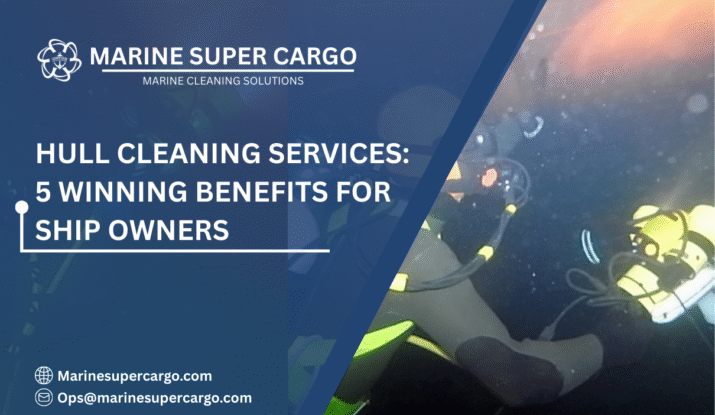Imagine your vessel as a champion swimmer—sleek, fast, and built to conquer oceans. But what if you let barnacles and algae slow it down? Without Hull Cleaning Services as part of ship management, even the best ship struggles against hidden drag, rising costs, and looming compliance risks.
For ship owners, operators, and managers, mastering Hull Cleaning Services is the edge that separates leaders from laggards in today’s demanding maritime world.
What Are Hull Cleaning Services?
Hull Cleaning encompasses the specialized techniques and technologies designed to remove biofouling—marine growth such as barnacles, algae, and mussels—that accumulate on a vessel’s underwater surfaces.
Left untreated, this build-up increases drag, raises fuel consumption, slows operations, and exposes shipowners to costly regulatory penalties. Modern services use a variety of methods, from skilled divers and remotely operated robots to advanced brush and water jet systems, ensuring precise and environmentally responsible cleaning.
By integrating these practices into routine ship management, owners and operators enhance fuel efficiency, reduce maintenance costs, and meet international compliance standards.
Ultimately, professional hull cleaning ensures vessels remain safe, competitive, and sustainable in an increasingly regulated and environmentally conscious maritime industry.

Why Regular Hull Cleaning Services Matter
Let’s unravel why Hull Cleaning Services should never be left to chance:
- Fuel Efficiency: Biofouling can increase fuel consumption by up to 20–40%, draining budgets and operational performance.
- Environmental Compliance: Ships with clean hulls release fewer emissions and comply with global standards like MARPOL and IMO’s Energy Efficiency Design Index (EEDI).
- Operational Reliability: Regular Hull Cleaning Services help prevent breakdowns and costly delays, extending vessel lifespans and protecting investments.
- Competitive Advantage: Clean hulls enable faster, safer journeys and easier compliance with green port initiatives and incentives.
The Story of Performance: How Hull Cleaning Transformed a Fleet
Picture a fleet operator frustrated by recurring fuel spikes and unpredictable schedules. By investing in routine Hull Cleaning Services—using robotic cleaners and foul-release coatings—the business slashed annual fuel costs by millions and achieved faster, more reliable voyages.
Their secret? Data-driven maintenance and expert partnerships, blending ship management expertise with cutting-edge service.
Varieties of Hull Cleaning Services
Modern ship management tailors Hull Cleaning Services to ship type, fouling severity, and port restrictions. Techniques include:
- Mechanical Cleaning: High-powered brushes (e.g., Brush-Kart) and divers to scrub marine growth.
- Robotic Cleaning: Remotely Operated Vehicles (ROVs) that clean hulls safely and efficiently, often while cargo operations continue.
- Chemical & Thermal Cleaning: Specialized chemicals and heat treatments are used to dissolve stubborn fouling, minimizing surface stress.
- Hydro Jetting: High-pressure seawater jets to blast off debris without harming coatings.
Technical Jargon Made Simple
- Biofouling: Marine organisms growing on ship hulls, causing drag and higher fuel use.
- Fuel Penalty: Extra fuel consumed due to hull roughness or fouling.
- EEDI (Energy Efficiency Design Index): IMO’s benchmark for energy-efficient ship designs.
- ROV (Remotely Operated Vehicle): A robot that cleans underwater hulls without human divers.
Compliance and Cost-Saving Impacts
Clear cleaning routines backed by proper documentation make hull cleaning a powerful tool for both compliance and cost control. By meeting international standards set by MARPOL, the IMO, and local port authorities, shipowners reduce the risk of fines, detentions, and costly off-hire periods.
The financial benefits are equally compelling: smooth, clean hulls reduce drag, lower fuel consumption, and minimize mechanical strain, extending the vessel’s operational lifespan.
At the same time, proactive hull maintenance strengthens a company’s reputation for environmental responsibility, ensuring sustainable performance while protecting profits in today’s highly regulated maritime industry.
✅ 4 Things to Check for Safety at Sea pic.twitter.com/dAxhJQ2i6U
— Marine Super Cargo (@Marinsupercargo) September 14, 2025
Environmental Benefits of Modern Hull Cleaning
Modern hull cleaning services deliver more than operational savings—they contribute directly to environmental protection and sustainable shipping. A clean hull lowers drag, which reduces fuel consumption and significantly cuts CO₂ emissions, helping vessels minimize their overall carbon footprint.
Regular underwater cleaning also plays a critical role in preventing the transfer of invasive aquatic species between ports, protecting biodiversity and fragile marine ecosystems. By adopting these practices, shipowners not only safeguard the environment but also demonstrate alignment with leading global frameworks such as MARPOL and the International Association of Ports and Harbors (IAPH).
This proactive approach ensures fleets are prepared for stricter environmental regulations, while unlocking opportunities for future green incentives, carbon credits, and reputational advantages in maritime trade. Also read about underwater hull cleaning in Cochin.
Integrating Hull Cleaning Services into Ship Management
Winning fleet managers weave Hull Cleaning Services into maintenance plans using:
- Scheduled Cleaning Cycles: Linked with operational calendars for minimal downtime.
- Digital Logbooks: Track cleaning operations, biofouling levels, and performance improvements.
- Strategic Partnerships: Partnering with leading Hull Cleaning Services providers ensures global coverage and expert solutions.
- Continuous Improvement: Testing new coatings, monitoring fuel data, and refining cleaning intervals keep vessels at the cutting edge.

Innovations Shaping Hull Cleaning
Expect game-changing advancements:
- Autonomous Cleaning Robots: minimize risk and maximize efficiency with sensors and AI decisions.
- Eco-Friendly Coatings: Reduce fouling and cleanings, maximizing results and lowering environmental impact.
- Remote Data Sharing: Collaborate with ports and regulators in real-time, ensuring seamless compliance.
Conclusion
Investing in professional hull cleaning services delivers measurable value for shipowners, operators, and managers. A clean, well-maintained hull reduces drag, improves fuel efficiency, and minimizes unnecessary downtime, directly translating into cost savings.
Beyond economics, effective hull cleaning ensures compliance with international regulations such as IMO and MARPOL, giving peace of mind during inspections and port calls. It also plays a vital role in reducing emissions, supporting global sustainability goals, and strengthening a company’s green reputation in maritime trade.
Treating hull cleaning as a strategic priority—rather than a routine expense—helps future-proof operations, enhance performance, and protect long-term profitability. For optimal results, partnering with trusted specialists like CleanShip.co ensures reliable, compliant, and sustainable fleet maintenance.
FAQs:
Q1. How often should ships use Hull Cleaning Services?
Most ships benefit from scheduled Hull Cleaning Services at least every 12–18 months, or more frequently in warm, nutrient-rich waters and active ports.
Q2. What are the key benefits of Hull Cleaning Services in ship management?
Hull Cleaning Services increase fuel efficiency, enhance performance, reduce emissions, and help ships comply with international standards like MARPOL and IMO.
Q3. How do robotic Hull Cleaning Services compare to manual methods?
Robotic Hull Cleaning Services, including ROVs, deliver safer, faster, and often more thorough cleaning with less coating damage, and can operate during cargo activities.
Q4. Can Hull Cleaning Services reduce regulatory fines?
Yes, clean hulls lower the risk of non-compliance penalties from MARPOL, IMO, and port authorities regulating emissions and invasive species.


